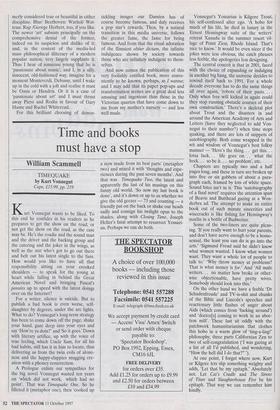Time and books must have a stop
William Scammell
TIMEQUA10E
by Kurt Vonnegut Cape, £15.99, pp. 219
Kurt Vonnegut wants to be liked. To this end he confides in his readers as he prepares to get the show on the road, or not get the show on the road, as the case may be. He's the roadie and the sound man and the driver and the backing group and the catering and the joker in the wings, as well as the star who's got to go out there and belt out his latest single to the fans. How would you like to have all that responsibility sitting on your crooked shoulders — to speak for the young at heart while falling in behind the Great American Novel and bringing Pascal's pensees up to speed with the latest doings over on the Internet?
For a writer, silence is suicide. But to publish a bad book is even worse, self- slaughter by degrees, under the arc lights. What to do? Vonnegut's long-term strategy has been to come down off the page, shake your hand, gaze deep into your eyes and say 'How're ya doin?' and 'So it goes.'Down with literary artifice, up with the voice of true feeling, which Uncle Sam, for all his bad habits, still has it in him to locate, thus delivering us from the twin evils of alone- ness and the happy-clappies mugging cre- ation with a phoney resurrection.
A Prologue enlists our sympathies for the big novel Vonnegut wasted ten years on 'which did not work, which had no point'. That was Timequake One. So he filleted it (metaphor one), then 'cooked up a stew made from its best parts' (metaphor two) and mixed it with `thoughts and expe- riences during the past seven months'. And that was Timequake Two, the latest and apparently the last of his musings on this funny old world. 'So now my last book is done', and it's down or up to us whether we give the old geezer — 73 and counting — a friendly pat on the back or shake our heads sadly and consign his twilight opus to the shades, along with Closing Time, Joseph Heller's fatal attempt to resurrect Yossari- an. Perhaps we can do both. Vonnegut's Yossarian is Kilgore Trout, his self-confessed alter ego. 'A hobo for much of his life, he died in luxury in the Ernest Hemingway suite of the writers' retreat Xanadu in the summer resort vil- lage of Point Zion, Rhode Island. That's nice to know.' It would be even nicer if the jokes were less obvious, the catch phrases less feeble, the apologetics less designing.
The central conceit is that in 2001, faced with the choice of expanding or indulging in another big bang, the universe decides to rewind itself back to 1991. For a whole decade everyone has to do the same things all over again, `robots of their pasts. . . . Only when free will kicked in again could they stop running obstacle courses of their own construction.' There's a skeletal plot about Trout and the disasters in and around the American Academy of Arts and Letters (have they neglected to add Von- negut to their number?) when time stops quaking, and there are lots of snippets of autobiography. Both come wrapped in the wit and wisdom of Vonnegut's best folksy manner — 'Here's the thing. . get this. . . lotsa luck. . . life goes on. . . what the heck.., so be it. . . no problem', etc.
Chapters are typically two and a half pages long, and these in turn are broken up into five or six gobbets of about a para- graph each, framed by lots of white space. Sound bites isn't in it. This 'autobiography of a final novel' requires the attention span of Beavis and Butthead gazing at a Won- derbra ad. The attempt to make an entire book out of such minute sincerities and wisecracks is like fishing for Hemingway's marlin in a bottle of Budweiser.
Some of the two-liners are quite pleas- ing. 'If you really want to hurt your parents, and don't have nerve enough to be a homo- sexual, the least you can do is go into the arts.' Sigmund Freud said he didn't know what women wanted. I know what women want. They want a whole lot of people to talk to.' Why throw money at problems? That is what money is for.' And 'All male writers. . . no matter how broke or other- wise objectionable, have pretty wives. Somebody should look into this.'
On the other hand we have a feeble 'Dr Schadenfreude' and TV-is-shit and chunks of the Bible and Lincoln's speeches and reactionary little flashes of anger about Aids (which comes from 'fucking around') and 'doctor[s] coming to work in an abor- tion mill'. These last sit oddly with the patchwork humanitarianism that clothes this hobo in a warm glow of ging-a-ling!' philosophy, three parts Californian Zen to two of self-congratulation CI was gazing at a list of all I'd published, and wondering, "How the hell did I do that?" ').
At one point, I forget where now, Kurt or Kilgore lets slip something weighty and adds, 'Let that be my epitaph.' Absolutely not. Let Cat's Cradle and The Sirens of Titan and Slaughterhouse Five be his epitaph. That way we can remember him kindly.


















































































 Previous page
Previous page